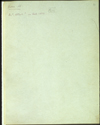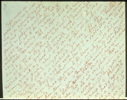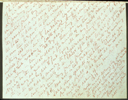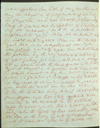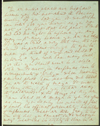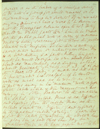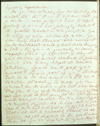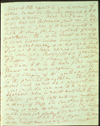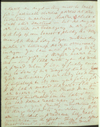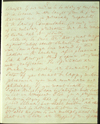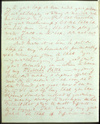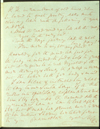Mahatma Letter No. 42
| Quick Facts | |
|---|---|
| People involved | |
| Written by: | Morya |
| Received by: | A. P. Sinnett |
| Sent via: | unknown |
| Dates | |
| Written on: | unknown |
| Received on: | January 1882 |
| Other dates: | unknown |
| Places | |
| Sent from: | unknown |
| Received at: | Allahabad, India |
| Via: | unknown |
This is Letter No. 42 in The Mahatma Letters to A. P. Sinnett, 4th chronological edition. It corresponds to Letter No. 43 in Barker numbering. See below for Context and background.
< Prev letter chrono
Next letter chrono >
< Prev letter Barker
Next letter Barker >
Cover sheet
|
Received Allahabad, February, 1882. |
NOTES: |
Page 1 & 2 transcription, image, and notes
|
Before another line passes between us we must come to an agreement, my impulsive friend. You will have first to promise me faithfully never to judge of either of us, nor of the situation, nor of anything else bearing any relation to the "mythical Brothers" — tall or short — thick or thin — by your worldly experience or you will never come at the truth. By doing so until now you have only disturbed the solemn quiet of my evening meals several nights running and made my snake-like signature what with your writing it and thinking about it to haunt me even in my sleep — as by sympathy I felt it being pulled by the tail at the other side of the hills. Why will you be so impatient? You have a life time before you for our correspondence; though while the dark clouds of the Deva-Lok "Eclectic" are lowering on the horizon of the "Parent" it has to be a spasmodic and an uncertain one. It may even suddenly break off owing to the tension given it by our too intellectual friend. Oy-hai, Ram Ram! To think that our very mild criticism upon the pamphlet, a criticism reported by you to Hume Sahib — should have brought the latter to kill us at a blow! to destroy, without giving us one moment to call a Padri in or even time to repent; to find ourselves alive, and yet so cruelly deprived of our existence is truly sad, tho' not quite unexpected. But it is all our own fault. Had we — instead prudently sent a laudatory hymn to his address we might now have been alive and well, waxing in health and strength — if not in wisdom — for long years to come and finding in him our Ved-Vyasa to sing the occult prowess of the Krishna and Arjuna on the desolate shores of Tsam-po. Now that we are dead and dessicated tho', I may as well occupy a few minutes of my time to write as a bhut to you, in the best English I find lying idle in my friend's brain; where also I find in the cells of memory the phosphorescent thought of a short letter to be sent by himself to the Editor of the Pioneer to soothe his English impatience. My friend's friend — K.H. has not forgotten you; K.H. does not intend breaking off with you — unless Hume Sahib should spoil the situation beyond mending. And why should he? You have done all you could, and that is as much as we ever intend asking of any one. And now we will talk. You must thoroughly put aside the personal element if you would get on with occult study and — for a certain time — even with himself. Realize, my friend, that the |
NOTES:
|
Page 3
|
social affections have little, if any, control over any true adept in the performance of his duty. In proportion as he rises towards perfect adeptship the fancies and antipathies of his former self are weakened: (as K.H. in substance explained to you) he takes all mankind into his heart and regards them in the mass. Your case is an exceptional one. You have forced yourself upon him, and stormed the position, by the very violence and intensity of your feeling for him — and once be accepted he has to bear the consequences in the future. Yet it cannot be a question with him what the visible Sinnett may be — what his impulses, his failures or successes in his world, his diminished or undiminished regard for him. With the "visible" one we have nothing to do. He is to us only a veil that hides from profane eyes that other ego with whose evolution we are concerned. In the external rupa do what you like, think what you like: only when the effects of that voluntary action are seen on the body of our correspondent — is it incumbent upon us to notice it. |
NOTES:
|
Page 4
|
We are neither pleased nor displeased because you did not attend the Bombay meeting. If you had gone, it would have been better for your "merit": as you did not go you lost that little point. I could and had no right to influence you any way — precisely because you are no chela. It was a trial, a very little one, tho' it seemed important enough to you to make you think of "wife and child's interests." You will have many such; for though you should never be a chela, still we do not give confidences even to correspondents and "proteges" whose discretion and moral pluck have not been well tested. You are the victim of maya. It will be a long struggle for you to tear away the "cataracts" and see things as they are. Hume Sahib is a maya to you as great as any. You see only his mounds of flesh and bones, his official personality, his intellect and influences. What are these, pray, to his true self that you cannot see, do what you may? What has his ability to shine in a |
NOTES:
|
Page 5
|
Durbar or as the leader of a scientific society to do with his fitness for occult research, or his trustworthiness to keep our secrets? If we wanted anything about our lives and work to be known is not the Theosophist columns open to us? Why should we dribble facts thro' him, to be dressed for the public meal with a currie of nauseous doubts and biting sarcasm fit to throw the public stomach into confusion. To him there is nothing sacred, either within, or without occultism. His is a bird-killing and a faith-killing temperament; he would sacrifice his own flesh and blood as remorselessly as a singing bulbul; and would dessicate yourself and us, K.H. and the "dear Old Lady" and make us all bleed to death under his scalpel — if he could — with as much ease as he would an owl, to put us away in his "museum" with appropriate labels outside and then recount our necrologies in "Stray Feathers" to the amateurs. No Sahib; the outside Hume is as different (and superior) from the inside Hume, as the outside Sinnett is different (and inferior) to the nascent inside "protege." Learn that and sit the latter to watching the editor, least he play him a bad trick some day. Our greatest trouble is to teach pupils not to be |
NOTES:
|
Page 6
|
befooled by appearances. As you have already been notified by Damodar thro' the D---, I did not call you a chela — examine your letter to assure yourself of it — I but jokingly asked O. the question whether he recognised in you the stuff of which chelas are made. You saw only that Bennett had unwashed hands, uncleaned nails and used coarse language and had — to you — a generally unsavoury aspect. But if that sort of thing is your criterion of moral excellence or potential power, how many adepts or wonder producing lamas would pass your muster? This is part of your blindness. Were he to die this minute — and I'll use a Christian phraseology to make you comprehend me the better — few hotter tears would drop from the eye of the recording Angel of Death over other such ill-used men, as the tear Bennett would receive for his share. Few men have suffered — and unjustly suffered — as he has; and as few have a more kind, unselfish and truthful a heart. That's all: and the unwashed Bennett is morally as far superior to the gentlemanly Hume as you are superior to your Bearer. |
NOTES: |
Page 7
|
What H.P.B. repeated to you is correct: "the natives do not see Bennett's coarseness and K.H. is also a native." What did I mean? Why — simply that our Buddha-like friend can see thro' the varnish, the grain of the wood beneath and inside the slimy, stinking oyster — the "priceless pearl within!" B---- is an honest man and of a sincere heart, besides being one of tremendous moral courage and a martyr to boot. Such our K.H. loves — whereas he would have only scorn for a Chesterfield and a Grandison. I suppose that the stooping of the finished "gentleman" K.H., to the coarse fibred infidel Bennett is no more surprising than the alleged stooping of the "gentleman" Jesus to the prostitute Magdalene: There's a moral smell as well as a physical one good friend. See how well K.H. read your character when he would not send the Lahore youth to talk with you without a change of dress. The sweet pulp of the orange is inside the skin — Sahib: try to look inside boxes for jewels and do not trust to those lying in the lid. I say again: the man is an honest man and a very earnest one; not |
NOTES:
|
Page 8
|
exactly an angel — they must be hunted for in fashionable churches, parties at aristocratical mansions, theatres and clubs and such other sanctums — but as angels are outside our cosmogony we are glad of the help of even honest and plucky tho' dirty men. All this I say to you without any malice or bitterness, as you erroneously imagine. You have made progress during the past year — and therefore nearer to us — hence I talk with you as with a friend, whom I hope of finally converting to some of our ways of thinking. Your enthusiasm for our study has a tinge of selfishness in it; even your feeling for K.H. has a mixed character: still you are nearer. Only you trusted Hume too much, and mistrusted him too late, and now his bad karma reacts upon yours, to your detriment. Your friendly indiscretions as to things confided to you alone by H.P.B. — the cause — produces his rash publicities — the effect. This I am afraid must count against you. Be wiser |
NOTES: |
Page 9
|
hereafter. If our rule is to be chary of confidences it is because we are taught from the first that each man is personally responsible to the Law of Compensation for every word of his voluntary production. Mr. Hume would of course call it jesuitry. Also try to break thro' that great maya against which occult students, the world over, have always been warned by their teachers — the hankering after phenomena. Like the thirst for drink and opium, it grows with gratification. The Spiritualists are drunken with it; they are thaumaturgic sots. If you cannot be happy without phenomena you will never learn our philosophy. If you want healthy, philosophic thought, and can be satisfied with such — let us correspond. I tell you a profound truth in saying that if you (like your fabled Shloma) but choose wisdom all other things will be added unto it — in time. It adds no force to our metaphysical truths that our letters are dropped from space |
NOTES:
|
Page 10
|
on to your lap or come under your pillow. If our philosophy is wrong a wonder will not set it right. Put that conviction into your consciousness and let us talk like sensible men. Why should we play with Jack-in-the-box; are not our beards grown. And now it is time to put a stop to my abominable penmanship and so relieve you from the task. Yes — your "cosmogony"! Well, good friend, your cosmology is — between the leaves of my Khuddaka Patha — (my family Bible) and making a supreme effort I will try to answer it as soon as I am relieved, for just now I am on duty. It is a life long task you have chosen, and somehow instead of generalizing you manage always to rest upon those details that prove the most difficult to a beginner. Take warning my good Sahib. The task is difficult and |
NOTES:
|
Page 11
|
K.H. in remembrance of old times, when he loved to quote poetry, asks me to close my letter with the following to your address: "Does the road wind up-hill all the way? "Yes to the very end." "Will the day's journey take the whole long day? "From morn to night, my friend." Knowledge for the mind, like food for the body, is intended to feed and help to growth, but it requires to be well digested and the more thoroughly and slowly the process is carried out the better both for body and mind. I saw Olcott and instructed him what to say to our Simla Sage. If the O.L. rushes into epistolary explanations with him, stop her — as O. covered all the ground. I have no time to look after her, but I made her promise never to write to him without showing her letter first to you. Namascar. Yours M. |
|
NOTES:
|
Context and background
Physical description of letter
The original is in the British Library, Folio 2. George Linton and Virginia Hanson described the letter in this way:
In dark red ink on three full-sized sheets of white paper. The writing on two of the sheets is diagonally across. The signature is a bit different in that the initial has no "tail," but has a line beneath it which is looped at both ends.[2]
Publication history
Commentary about this letter
Notes
- ↑ C. Jinarajadasa, Letters from the Masters of the Wisdom, First Series (Adyar, Chennai, India: Theosophical Publishing House, 2011), 155.
- ↑ George E. Linton and Virginia Hanson, eds., Readers Guide to The Mahatma Letters to A. P. Sinnett (Adyar, Chennai, India: Theosophical Publishing House, 1972), 93.
